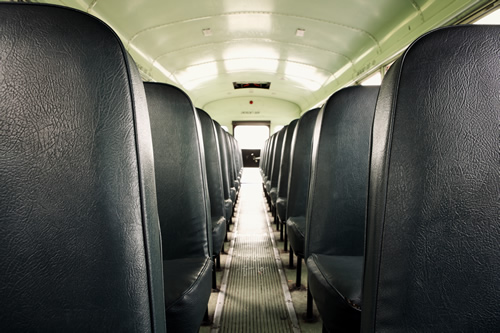Spotting a converted school bus on the road is always a cool experience. What replaced those beloved rows of seats, and how did the vision for such a project originate?
Many people use a converted school bus as the foundation for a tiny house, others create traveling vacation homes, and others use a converted school bus for charitable or educational purposes.
Related content: Texas district launches connected school buses
But a school bus doesn’t have to stop being associated with learning just because it no longer transports students back and forth from school and field trips. Some educators and education organizations use converted school buses as an opportunity to start learning labs ranging from STEM education to art studios.
6 examples of how a converted school bus can transform learning
1. The STEAM Bus is an innovative project which helps children grasp scientific concepts through fun and learning. Through the support of Columbia Public Schools (MO), the STEAM Bus travels to students to bring more STEM-related learning to the classroom and better prepare children for their futures. The converted school bus can accommodate up to 25 kids at a time and features a variety of tools including 3D printers, virtual reality goggles, and micro:bits. Since it’s inception in 2015, the STEAM Bus has served more than 5,000 students within the district’s elementary and middle schools, as well as in neighboring districts in Boone County.
2. The Baltimore County Public Schools launched its Mobile Innovation Lab in 2016. The Mobile Innovation Lab is a converted school bus serving as a maker space and innovation station for the district’s schools, centers, and programs. Housed within the Mobile Innovation Lab are the tools, materials, and instructional supports for students and stakeholders to truly innovate. Materials include a 3D printer, a Makey Makey, LEGOs, Ozobots, and more. The Mobile Innovation Lab’s residency program and availability for school and BCPS-affiliated community events provide opportunities to reach all Baltimore County Public Schools stakeholders.
3. Pennsylvania’s Downingtown Community Education Foundation’s (DCEF) Mobile Innovation Lab Project transformed a handicap accessible school bus into a state-of-the-art STEAM mobile classroom that travels to each of the Downingtown Area School District’s 10 elementary schools ensuring equitable access to work with the advanced technologies and participate in unique educational experiences. Housed within the Mobile Innovation Lab will be all the tools, materials and instructional supports including Wi-Fi connectivity, computers and robotics kits to ensure that all 6,000 K-5 students regardless of gender, race, ability, or income gain confidence in their ability to succeed in a STEM/STEAM related field.
4. In San Antonio, the Geekbus is a mobile makerspace that travels to schools and other organizations to provide STEM educational experiences in their classrooms. The converted school bus aims to inspire and spark students’ interest in skills needed for the 21st century. Geekbus educators teach students the value of design thinking, encouraging them to apply these concepts to solve problems in the classroom as well as in the real world.
5. In the Beaverton School Disrict, the FutureBus features 3D printers, robotics, and other equipment and supplies to help spark students’ creativity and desire to explore and invent. The mobile makerspace, housed in a converted school bus, operates on a simple idea, stated on the FutureBus website: “It doesn’t matter if you use a 3D printer, a laser cutter, or glue sticks and cardboard. Learning ignites when kids see their idea made into a real thing. It works whether they make a model robot, a video game, or their first feature film.”
6. Rosybelle is 72-passenger converted school bus in Colorado that has been transformed into a dynamic, interactive and accessible mobile arts classroom and makerspace. Programming on Rosybelle includes subsidized after-school classes, collaborations with public and private schools as well as other nonprofits in the area. The bux is equipped with workstations for up to 12 children and 8 adults, solar power and a Wi-Fi hotspot, 6 Macbook Airs, screenprinting set-up, a utility sink, sewing machines, printing press, turntables, extra tables and awning for outdoor work space expansion, and basic art supplies.
- Student success is impacted by issues outside of school, survey finds - May 1, 2024
- Friday 5: Virtual field trips - April 26, 2024
- Google, MIT RAISE launch no-cost AI training course for teachers - April 26, 2024

